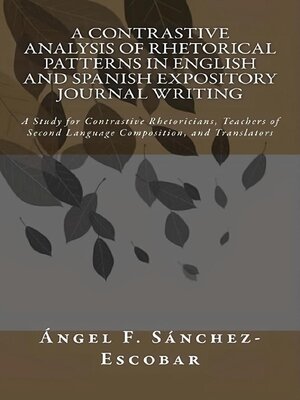A Contrastive Analysis of Rhetorical Patterns in English and Spanish Expository Journal Writing
ebook
By Ángel Francisco Sánchez Escobar

Sign up to save your library
With an OverDrive account, you can save your favorite libraries for at-a-glance information about availability. Find out more about OverDrive accounts.
Find this title in Libby, the library reading app by OverDrive.



Search for a digital library with this title
Title found at these libraries:
| Library Name | Distance |
|---|---|
| Loading... |
The great English scientist and philosopher of the Seventeenth Century, Francis Bacon, observed in his essay "Of Studies" that "Reading maketh a full man: conference a ready man; and writing an exact man." Most teachers, in fact, most well educated individuals, would agree with Bacon's observation on the importance of learning to write well. Most would also agree that novice writers can learn much from reading extensively. By observing how good writers put together a piece of expository writing, choose words, structure sentences, and thus, how their whole argument fits together, novice writers can model good techniques in their own work. However, as anyone who has tried to read and write in a second language quickly discovers, the conventions and parameters for what constitutes "good writing" seem to differ between languages. Teachers agree that good writing communicates with its audience and does so with a certain style, but beyond those commonalities, they agree on little else.







